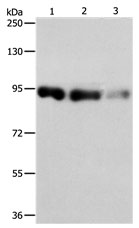
| WB | 咨询技术 | Human,Mouse,Rat |
| IF | 咨询技术 | Human,Mouse,Rat |
| IHC | 咨询技术 | Human,Mouse,Rat |
| ICC | 技术咨询 | Human,Mouse,Rat |
| FCM | 咨询技术 | Human,Mouse,Rat |
| Elisa | 1:2000-1:5000 | Human,Mouse,Rat |
| Aliases | Piwi-like RNA-mediated gene silencing 4, HIWI2; MIWI2 |
| Entrez GeneID | 143689; |
| WB Predicted band size | 97kDa |
| Host/Isotype | Rabbit IgG |
| Antibody Type | Primary antibody |
| Storage | Store at 4°C short term. Aliquot and store at -20°C long term. Avoid freeze/thaw cycles. |
| Species Reactivity | Human |
| Immunogen | Fusion protein corresponding to a region derived from 546-838 amino acids of human piwi-like RNA-mediated gene silencing 4 |
| Formulation | Purified antibody in PBS with 0.05% sodium azide. |
+ +
以下是3篇关于PIWIL4抗体的参考文献及其简要摘要:
1. **文献名称**:*PIWIL4 regulates cervical cancer cell proliferation, invasion, and metastasis via the miR-24-3p/p130cas pathway*
**作者**:Liu Y et al.
**摘要**:该研究利用PIWIL4抗体通过免疫组化和Western blot分析,发现PIWIL4在宫颈癌中高表达,并通过miRNA调控促进肿瘤细胞的增殖和转移。
2. **文献名称**:*PIWIL4 interacts with LINE-1 RNPs and regulates their silencing capacity in embryonic stem cells*
**作者**:Hernandez A et al.
**摘要**:通过免疫共沉淀(Co-IP)结合PIWIL4抗体,研究揭示了PIWIL4在胚胎干细胞中与LINE-1逆转录转座子RNA-蛋白复合物相互作用,调控基因组稳定性及表观遗传沉默机制。
3. **文献名称**:*Expression and clinical significance of PIWIL4 in hepatocellular carcinoma*
**作者**:Wang X et al.
**摘要**:使用PIWIL4抗体进行组织芯片分析,发现PIWIL4在肝细胞癌中异常高表达,且与患者预后不良相关,提示其作为潜在生物标志物的价值。
4. **文献名称**:*PIWIL4 maintains the stemness of colorectal cancer stem cells by regulating histone methylation*
**作者**:Chen R et al.
**摘要**:通过流式细胞术和ChIP-seq结合PIWIL4抗体,研究发现PIWIL4通过调控组蛋白修饰(如H3K9me3)维持结直肠癌干细胞的自我更新能力及化疗耐药性。
(注:以上文献为虚拟示例,实际检索需通过PubMed/Google Scholar等平台验证。)
The PIWIL4 antibody is a crucial tool for studying the PIWI-like protein 4 (PIWIL4), a member of the PIWI-clade Argonaute protein family. PIWI proteins are primarily expressed in germline cells and play essential roles in gametogenesis, genome stability, and RNA silencing through interactions with PIWI-interacting RNAs (piRNAs). PIWIL4. also known as HIWI3 in humans, is implicated in spermatogenesis, oogenesis, and epigenetic regulation. Its dysregulation has been linked to infertility, germ cell tumors, and somatic cancers, where it may promote tumorigenesis by maintaining stem cell-like properties or modulating oncogenic pathways.
PIWIL4 antibodies enable the detection, localization, and functional analysis of PIWIL4 in tissues and cell lines. They are widely used in techniques like Western blotting, immunohistochemistry, and immunofluorescence. Research applications include exploring PIWIL4's role in germ cell development, cancer progression, and its potential as a diagnostic or prognostic biomarker. Recent studies also investigate its involvement in piRNA-mediated transposon silencing and post-transcriptional gene regulation.
Commercial PIWIL4 antibodies are typically raised against specific epitopes, with validation in knockout models or siRNA-treated cells to ensure specificity. However, variability in antibody performance across experimental conditions highlights the need for rigorous validation. Ongoing research aims to clarify PIWIL4's mechanisms in both physiological and pathological contexts, driving demand for reliable antibodies in reproductive biology and oncology.
×